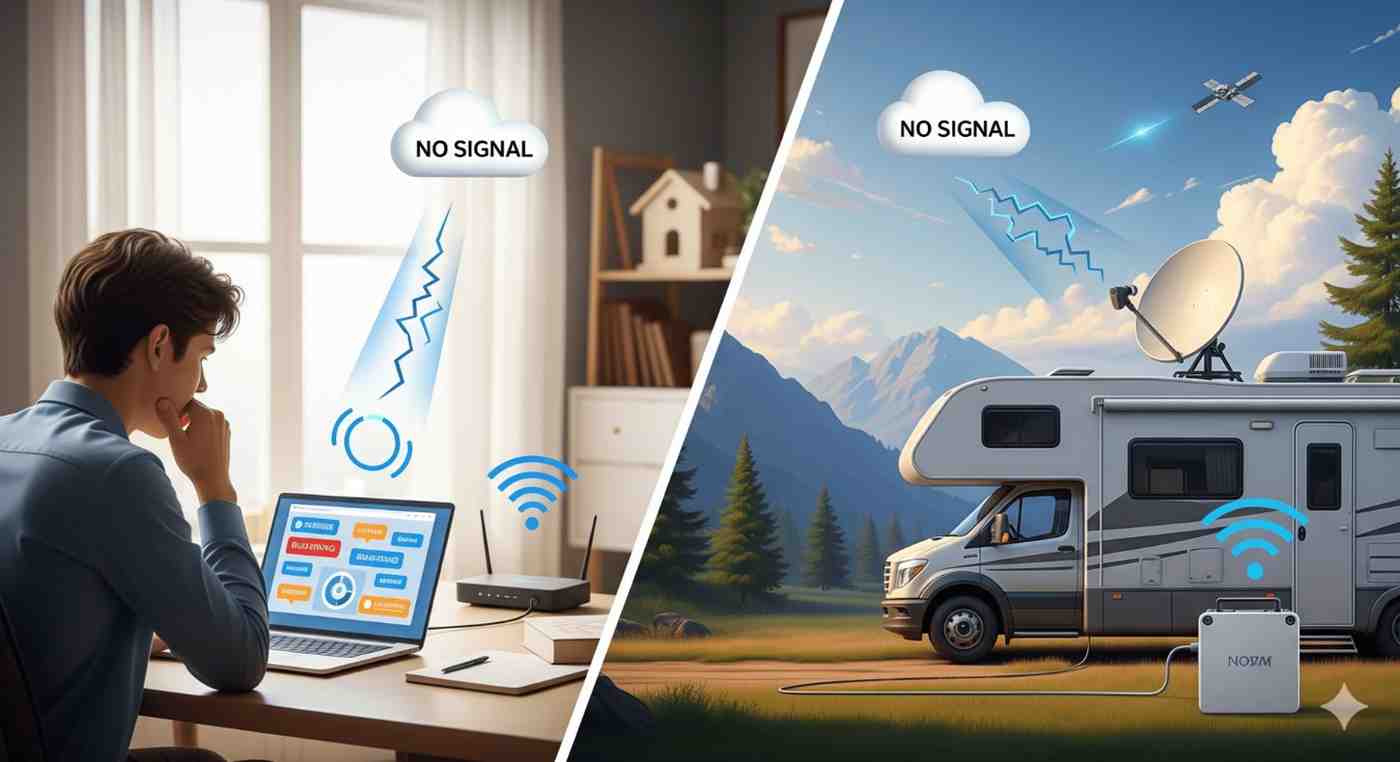


Discover why your internet is slow and learn practical tips to boost speed. Find out how Ubifi keeps RVs, homes, and travelers reliably connected.
Few things are more frustrating than slow internet, especially when you’re trying to stream a movie, join a video meeting, or upload important files. For RV travelers and people in rural areas, the struggle can feel even worse. Slow speeds can disrupt your plans, delay your work, and cause unnecessary stress.
The good news is that most internet speed issues aren’t permanent. If you’ve ever wondered, “Why is my internet slow?” the answer usually involves common factors—and many of them are easy to fix.
This guide will explain why internet speeds slow down, the best ways to fix WiFi or satellite connections, and how Ubifi helps travelers and remote users stay connected when other providers fail.
Slow internet doesn’t always mean your provider is to blame. Often, the issue lies with your equipment, device settings, or even your location. If you’ve been asking, “Why is my internet slow today?” here are the most common causes:
Every device connected to your network uses bandwidth. If several people in your household or RV are streaming, gaming, or downloading files at the same time, everyone will experience slower speeds.
Distance from your router, thick walls, or interference from appliances can weaken WiFi signals. For RVers, parking in an area with poor satellite coverage or too many obstacles can reduce speed significantly.
Old routers, modems, or cables may not support modern internet speeds. Even if your provider offers fast service, outdated equipment can hold you back.
Internet speeds often drop during peak usage hours, usually in the evenings when many people in your area are streaming and gaming. This congestion slows down the entire network.
Automatic updates, cloud backups, or streaming apps running in the background can consume bandwidth without you noticing. This is especially common on laptops and smartphones.
Weather conditions like heavy rain or storms can affect satellite internet. Even trees or tall buildings can interfere with a signal if you’re using wireless connections outdoors or while traveling.
If slow internet frustrates you, don’t worry—there are several simple fixes that can quickly restore your connection. These methods work for both home users and RV travelers.
One of the quickest and easiest solutions is to restart your modem and router. This clears temporary glitches and refreshes your connection. For satellite internet, power cycling the receiver can also reset and improve the signal.
Your router’s location matters. Keep it in a central, open area of your home or RV. For satellite receivers, position them where they have a clear view of the sky—away from trees, walls, or obstacles.
If you’re working remotely, focus on essential apps like video conferencing over large downloads or streaming. Encourage others to pause non-essential internet use during important calls or tasks. Scheduling updates and downloads overnight can also reduce interruptions.
Sometimes, small tweaks aren’t enough. If your router is outdated or your plan doesn’t meet your needs, upgrading can provide immediate improvement. Ubifi offers internet options designed for remote areas and RV life, giving you faster and more reliable connectivity than traditional providers.
Connecting devices with an Ethernet cable usually provides faster, more stable speeds than WiFi. This is especially helpful for smart TVs, gaming consoles, or work laptops where stability is crucial.
Check for background apps or devices that might be using your bandwidth. Disable auto-sync, schedule cloud backups, and pause automatic updates during peak usage times.
For larger spaces or RVs, WiFi extenders and boosters can strengthen weak signals and ensure coverage throughout your area.
For RVers, campers, and rural households, traditional internet providers often fall short. Dead zones, buffering, and dropped connections make everyday online activities challenging. That’s where Ubifi comes in.
Ubifi is built specifically for people on the move or living outside major cities. Unlike standard connections that weaken in rural areas, Ubifi delivers reliable internet coverage so you can stream, video call, or work without interruption.
Whether you’re camping in a national park or traveling across the country in your RV, Ubifi ensures you stay connected when you need it most. With stronger, more consistent service than typical satellite providers, it’s a solution designed for modern travelers.
Speeds often drop during the evening when more people are online. This network congestion puts extra strain on the system, leading to slower performance.
Yes. Old routers may not support current speeds or technologies. Upgrading to a modern router can significantly improve your WiFi performance.
Keep your router or receiver in an open location with minimal obstructions. Adding a WiFi extender or booster can help distribute signals more evenly throughout your RV.
Severe weather like heavy rain, snow, or storms can temporarily weaken satellite signals. Ubifi minimizes this issue by providing more stable connectivity designed for travelers.
Usually, no. A VPN can enhance security, but it often slows speeds slightly. The only exception is if your ISP limits specific activities, in which case a VPN may help.
Run speed tests at different times of the day. If your speeds consistently fall below your plan’s promised limits, it may be time to switch to a more reliable provider like Ubifi.
Slow internet can feel like an endless battle, especially when you’re traveling or living in rural areas with limited options. But in most cases, the problem has a simple solution. Restarting your equipment, moving your router, reducing background usage, or upgrading old devices can often lead to significant improvements.
For those who need dependable internet while camping, traveling, or living off the beaten path, Ubifi provides a reliable alternative. As a trusted rural wireless internet service provider, Ubifi ensures you stay connected, no matter where your journey takes you.
With the right steps—and the right provider—you can enjoy smoother browsing, faster downloads, and uninterrupted streaming, whether you’re at home or on the road.
